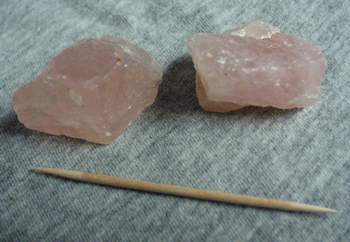Rose
Quartz


Actual Pieces found at
Serendipity Ranch Gem Mine
VARIETY INFORMATION:
- VARIETY OF: Quartz
, SiO 2 , Silicon Dioxide.
- USES: Gemstone and ornamental stone.
- COLOR: various shades of pink to a rosy-red.
- INDEX OF REFRACTION: 1.544-1.553
- BIREFRINGENCE: 0.009
- HARDNESS: 7
- CLEAVAGE: none
- CRYSTAL SYSTEM: trigonal
Rose quartz is one of the most desirable varieties of quartz.
The pink to rose red color completely unique, unlike any other pink mineral
species. The color is caused by iron and titanium impurities.
Rose quartz is used as an ornamental stone and as a gemstone.
Although rose quartz is usually too cloudy to be used as a cut gemstone, a few
exceptional pieces are found with enough clarity and color to make fine gems.
Most gemmy rose quartz is used as cabochons where the clarity is not as
important as the color. Rose quartz is also a very attractive ornamental stone
and is carved into popular spheres, pyramids, obelisks, figurines and ornate
statues.
Rose quartz is found in Madagascar, India, Germany and
several localities in the USA. Much rose quartz was extracted from a famous site
near Custer, South Dakota, but now, most of the worlds supply of good carvable
rose quartz comes from Brazil.
Brazil is also the only source of true well formed crystals
of rose quartz. All rose quartz was believed to be only massive, found primarily
in the cores of pegmatites. This lack of crystals is somewhat of a curiosity
because quartz crystallizes into well formed crystals in all its other
macroscopic varieties. So amazing are the rose quartz crystals that the first
ones discovered were dismissed as fakes by mineralogists from around the world.
If rutile needles are present in the rose quartz then a star
effect or asterism is sometimes seen. The star is best seen when light is viewed
through the rose quartz. This is different from asterisms in most other
gemstones, such as ruby and sapphire, where the stars are seen when light is
shown on the gems.

